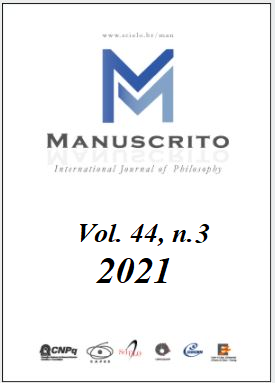Resumo
Despite the fact that the discussion on the economic man flourishes in John Stuart Mill’s work, this does not mean that this issue has not been previously discussed, at least, not in clear terms. The aim of this article is to demonstrate that even if Adam Smith never specifically characterized the person who deals with economic affairs, he pointed out some of his characteristics in his writings. We can find some clues to his thoughts on that issue in Theory of Moral Sentiments (1759), Lectures on Jurisprudence (1762) and The Wealth of Nations (1776). In this article, Smith’s homo oeconomicus is approached in three aspects: rational, moral and emotional. In addition, we also argue that the philosopher had advanced some studies of psychology and behavioral economics that would be developed from the twentieth century, which is discussed when we approach the emotional side of Smith’s economic man.
Referências
gosta, Lou. (2016) “Empathy and Sympathy in Ethics”. Internet Encyclopedia of Philosophy. Available at: http://www.iep.utm.edu/emp-symp/. Access at: 19 march 2016.
Ashraf, A.; Camerer C.; Loewenstein, G. (2005). Adam Smith, Behavioral Economist. Journal of Economic Perspectives, 19(3), 131-145
Broadie, Alexander, "Scottish Philosophy in the 18th Century", The Stanford Encyclopedia of Philosophy (Winter 2017 Edition), Edward N. Zalta (Ed.). Available in: https://plato.stanford.edu/archives/win2017/entries/scottish-18th/. Access at: 15 Feb. 2015.
Cooley, Charles. (1902). Human Nature and the Social Order. New York: Charles Scribner’s Sons.
Caruso, S. (2012) Homo oeconomicus: Paradigma, critiche, revisioni: Firenze University Press.
Darwall, Stephen. (1998). Empathy, Sympathy, Care, Philosophical Studies, number 89, Netherlands: Kluwer Academic Publishers.
Fleischacker, Samuel. (2012), “Sympathy in Hume and Smith: A Contrast, Critique and Reconstruction”, in Dagfinn Føllesdal and Christel Fricke (Eds.), Intersubjectivity and Objectivity in Adam Smith and Edmund Husserl, Frankfurt.
Glenney, B. (2011). Adam Smith and the Problem of the External World. Journal of Scottish Philosophy, 9(2), 205-223.
Goldman, Alvin and Shanton, Karen. (2010), “Simulation Theory”, Wiley Interdisciplinary Reviews: Cognitive Science, 2010, (2010), “Simulation Theory”, Wiley Interdisciplinary Reviews: Cognitive Science, 2010. Available in: https://www.wires.wiley.com/cogsci. Access at: 15 July 2017.
Goldman, Alvin. (2006) Simulating Minds, London: Oxford University Press.
Gordon, Robert. (2009) Folk Psychology as Mental Simulation, The Stanford Encyclopedia of Philosophy (Fall 2009 Edition), Edward N. Zalta (Ed.) Available in: https://plato.stanford.edu/archives/fall2009/entries/folkpsych-simulation/. Access at: 15 April 2016.
Grampp, W. (1948). Adam Smith and the Economic Man. Journal of Political Economy, 56(4), 315-336.
Griswold Jr., Charles. (2006). “Imagination: Morals, Science and Art” in Cambridge Companion to Adam Smith. Edited by Knud Haakonssen, Cambridge University Press.
Hill, L. (2012). Adam Smith on thumos and irrational economic ‘man’. Euro. J. History of Economic thought, 19(1), 1-22.
Kern, W. (2001). Classical Economic Man: Was he Interested in Keeping Up with the Joneses? Journal of the History of Economic Thought, 23(3), 353-368.
Luban, D. (2012). Adam Smith on Vanity, Domination, and History. Modern Intellectual History, 9(2), 275-302.
Martins, José Maria. (2004). A Lógica das Emoções na Ciência e na Vida. Petropolis: Editora Vozes.
Morgan, M. (2006). Economic Man as Model Man: Ideal Types, Idealization and Caricatures. Journal of the History of Economic Thought, 25 (1), 1-27.
Raphael, David Daiches. (1985). Adam Smith. Oxford: Oxford University Press.
Rela, Nara. (2019). The Pillars of Philosophy of Economic Behavior, São João del Rei.
Sen, A. (1987) On Ethics and Economics. Malden: Blackwell Publishing.
Smith, Adam. [1762] (1982a). “Lectures on Jurisprudence”, Adam Smith, Glasgow Edition of the Works and Correspondence, Vol. 5, Glasgow.
Smith, Adam. [1759] (1982b) The Theory of Moral Sentiments (1759), Ed. D. D. Raphael and A. L. Macfie, Indianapolis. Available in: http://oll.libertyfund.org/title/192. Access at: 12 September 2013b.
Smith, Adam. [1776] (1981) The Wealth of Nations, Ed. Edwin Cannan, Indianapolis. Available in: http://oll.libertyfund.org/titles/smith-an-inquiry-into-the-nature-and-causes-of-the-wealth-of-nations-cannan-ed-in-2-vols
Stanley, Steven (1895). Studies in the Evolutionary Psychology of Feeling. New York: Macmillan and Co.
Sroufe, L. Alan, (1996). Emotional development: The organization of emotional life in the early years. Cambridge studies in social & emotional development. Cambridge University Press.
Wasiluk A.; Giegiel, A; Zalesko M. (2018. The Evolution oft he Economic Man. From Homo Oeconomicus to Homo Moralis. Gospodarka Narodowa, 1(293), 33-57

Este trabalho está licenciado sob uma licença Creative Commons Attribution 4.0 International License.
Copyright (c) 2021 Nara Lucia Rela


